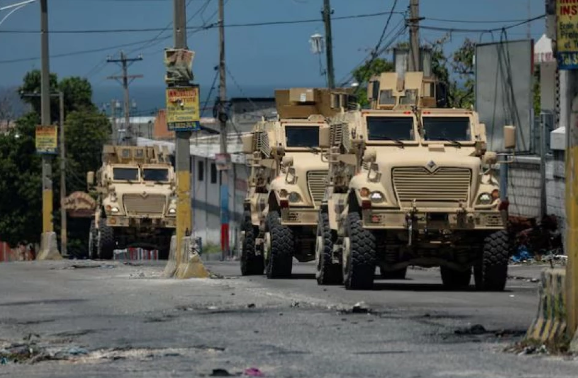The United States has stepped back from its push for the U.N. Security Council to request a plan to transition a security mission in Haiti, aimed at combating armed gangs, into a formal U.N. peacekeeping operation. According to diplomats, this move was seen as an attempt to accommodate Russia and China. However, a senior U.S. administration official disputed that interpretation, explaining that Washington’s shift in strategy was influenced by a call made last week by Edgard Leblanc, head of Haiti’s transition council, for a U.N. peacekeeping mission.
“It is not at all that we are bowing to those who might not have the best interests of the Haitian people at heart,” said the official, who spoke on condition of anonymity. “We are being strategic about how we’re going about this and building on the momentum we heard from the Haitian president.”
The 15-member Security Council is set to vote on Monday on a draft resolution to extend the mandate of the Multinational Security Support (MSS) mission until October 2, 2025. The U.N. initially approved this mission a year ago following a request for assistance from Haiti.
Diplomats noted that Russia and China were opposed to the council pushing for a plan to transition the U.N.-backed security mission into a full peacekeeping operation, which led the U.S. to remove that language from the draft resolution, according to a Reuters report.
Deputy Russian U.N. Ambassador Dmitry Polyanskiy explained, “Russia wants to allow more time for the security force to establish itself,” adding that “We don’t want to prejudge MSS’s outcome. It’s too early to make conclusions.”
Haitian leaders, speaking at the United Nations General Assembly last week, expressed concerns about worsening security conditions despite the partial deployment of the security mission. Armed gangs, heavily armed with weapons mostly trafficked from the United States, have consolidated power in the capital and are now extending their control to surrounding areas.
Leblanc addressed the U.N. General Assembly on Thursday, stating, “I am convinced that this change of status, while recognizing that the errors of the past cannot be repeated, would guarantee the full success of the mission in Haiti.”
The senior U.S. official noted that Washington would “work with partners over the coming weeks to support that call.” U.S. Secretary of State Antony Blinken had also raised the possibility of transitioning the security mission into a U.N. peacekeeping force during his visit to Haiti earlier this month.
However, many Haitians are skeptical about the presence of a U.N. armed force, remembering the devastating cholera outbreak and sex abuse scandals that followed previous U.N. missions.
The current international security mission, led by Kenya, while authorized by the U.N. Security Council, is not a formal U.N. operation. Countries contribute personnel and funding on a voluntary basis. So far, only 400 Kenyan police officers have been deployed, and there remains a significant funding gap.
Earlier this month, U.N. Secretary-General António Guterres expressed that forming a U.N. peacekeeping force might not be the best solution for Haiti, which is currently grappling with a humanitarian crisis characterized by widespread hunger, sexual violence, and mass displacements.
According to U.N. estimates, gang violence has forced more than 700,000 people in Haiti to flee their homes.



